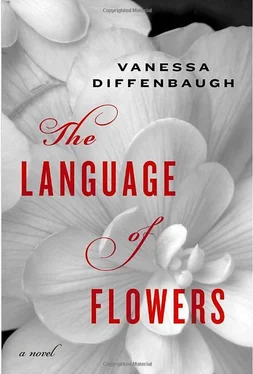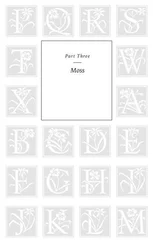Meredith checked in on me weekly. The judge had declared her my permanent connection , because emancipation legislation required a connection and they couldn’t dig anyone else out of my file. I did my best to avoid her. When I returned from my walks, I surveyed The Gathering House from the corner, walking up the front steps only when her white car wasn’t parked in the driveway. Eventually she divined my tactic, and in early September I unlocked the front door to find her sitting at the dining room table.
“Where’s your car?” I demanded.
“Parked around the block,” she said. “I haven’t seen you in over a month, so I figured you must be avoiding me. Is there a reason?”
“No reason.” I walked to the table and pushed someone’s dirty dishes out of the way. Sitting down, I placed fistfuls of lavender—which I had uprooted from a front yard in Pacific Heights—on the scratched wood between us. “Lavender,” I said, handing her a sprig. Mistrust .
Meredith spun the sprig between her thumb and forefinger and set it down, uninterested. “Job?” she asked.
“What job?”
“Do you have one?”
“Why would I have one?”
Meredith sighed. She picked up the lavender I’d given her and launched it, tip first, in my direction. It nose-dived like a poorly constructed paper airplane. Snatching it off the table, I smoothed its ruffled petals with a careful thumb.
“You would have one,” Meredith said, “because you’ve looked for one, and applied, and been hired. Because if you don’t, you’ll be out on the street in six weeks, and there won’t be anyone opening their door for you on a cold night.”
I looked to the front door, wondering how much longer until she’d leave.
“You have to want it,” Meredith said. “I can only do so much. At the end of the day, you have to want it.”
Want what? I always wondered when she said this. I wanted Meredith to leave. I wanted to drink the milk on the top shelf of the refrigerator labeled LORRAINE and add the empty jug to the collection in my room. I wanted to plant the lavender near my pillow and go to sleep inhaling the cool, dry scent.
Meredith stood. “I’ll be back next week when you least expect me, and I want to see a thick stack of job applications in your backpack.” She paused at the door. “It’ll be hard for me to put you out on the street, but you should know that I’ll do it.”
I did not believe it would be hard.
I walked into the kitchen and opened the freezer, poking through egg rolls and frostbitten corn dogs until I heard the front door close.
I spent my final weeks at The Gathering House transplanting my bedroom garden into McKinley Square, a small city park at the top of Potrero Hill. I’d found it while pacing the streets for help-wanted signs, and been distracted by the park’s perfect combination of sun, shade, solitude, and safety. Potrero Hill was one of the warmest neighborhoods in the city, and the park was located at a peak, with a clear view in every direction. A small, sandy play structure sat in the middle of a manicured square of lawn, but behind the lawn the park became forested and steep, tumbling downhill in a tangle of shrubs overlooking San Francisco General Hospital and a brewery. Instead of continuing my job search, I’d transported my jugs one at a time to the secluded spot. I chose the location for each planting thoughtfully—shade-loving plants under tall trees, those desiring sun a dozen yards down the hill, out of the shadows.
The morning of my eviction I awoke before dawn. My room was empty, the floor still damp and dirty in patches where the milk jugs had been. My imminent homelessness had not been a conscious decision; yet, rising to dress on the morning I was to be turned out onto the street, I was surprised to find that I was not afraid. Where I had expected fear, or anger, I was filled with nervous anticipation, the feeling similar to what I’d experienced as a young girl, on the eve of each new adoptive placement. Now, as an adult, my hopes for the future were simple: I wanted to be alone, and to be surrounded by flowers. It seemed, finally, that I might get exactly what I wanted.
My room was empty except for three sets of clothes, my backpack, a toothbrush, hair gel, and the books Elizabeth had given me. Lying in bed the night before, I’d listened to my housemates picking through the rest of my belongings like hungry animals devouring the fallen. It was standard procedure in foster and group homes, the scouring of things left behind by rushed, weepy children. My housemates, emancipated, carried on the tradition.
It’d been years—nearly ten—since I’d participated in the scavenging, but I could still remember the thrill of finding something edible, something I could sell at school for a nickel, something mysterious or personal. In elementary school I began to collect these small, forgotten things like treasures—a silver charm with an engraved M , a watchband of fake turquoise snakeskin, a quarter-sized pillbox containing a blood-encrusted molar—stuffing them into a mesh zippered bag I’d stolen from someone’s laundry room. The objects pressed through the tiny holes of the fabric as the bag grew full and heavy.
For a short time I told myself I was saving these objects for their rightful owners—not to give them back but to use as bribes for food or favors if we landed again in the same home. But as it grew I began to covet my collection, telling myself the stories of each object over and over again: the time I lived with Molly, the girl who loved cats; the bunk-mate whose watch had been ripped off and arm broken; the basement apartment where Sarah learned the truth about the Tooth Fairy. My attachment to the objects was not based on any connection with the individuals. More often than not I had avoided them, ignoring their names, their circumstances, the hopes they had for their futures. But over time the objects came to read like a string of clues to my past, a path of bread crumbs, and I had a vague sense of wanting to follow them back to the place before my memories began. Then, in a rushed, chaotic placement change, I’d been forced to leave the bag behind. For years afterward I’d refused to pack up my belongings, arriving at each new foster home stubbornly empty-handed.
Quickly, I began to dress: two tank tops followed by three T-shirts and a hooded sweatshirt, brown stretch pants, socks, and shoes. My brown wool blanket would not fit in my backpack, so I folded it in half, wrapped it around my waist, and secured a pleat with a safety pin at each inch. The bottom I gathered and pinned in bunches like a formal petticoat, covering the whole thing with two skirts of varying lengths, the first long and lacy orange, the second A-line and burgundy. I studied myself in the bathroom mirror as I brushed my teeth and washed my face, satisfied to see that I was neither attractive nor repulsive. My curves were well hidden beneath my clothing, and the extra-short haircut I’d given myself the night before made my bright blue eyes—the only remarkable feature on an otherwise ordinary face—look uncannily large, almost frightening in their dominance of my face. I smiled into the mirror. I didn’t look homeless. Not yet, at least.
I paused in the doorway of my empty room. Sunlight shone off the white walls. I wondered who would come next, and what they’d think of the weeds sprouting from the carpet near the foot of the bed. If I had thought of it, I would have left the new girl a milk jug full of fennel. The feathery plant and licorice-sweet smell would have been a comfort. But it was too late. I nodded goodbye to the room that would no longer be mine, feeling a sudden gratitude for the angle of the sun, the locking door, the brief offering of time and space.
Читать дальше












